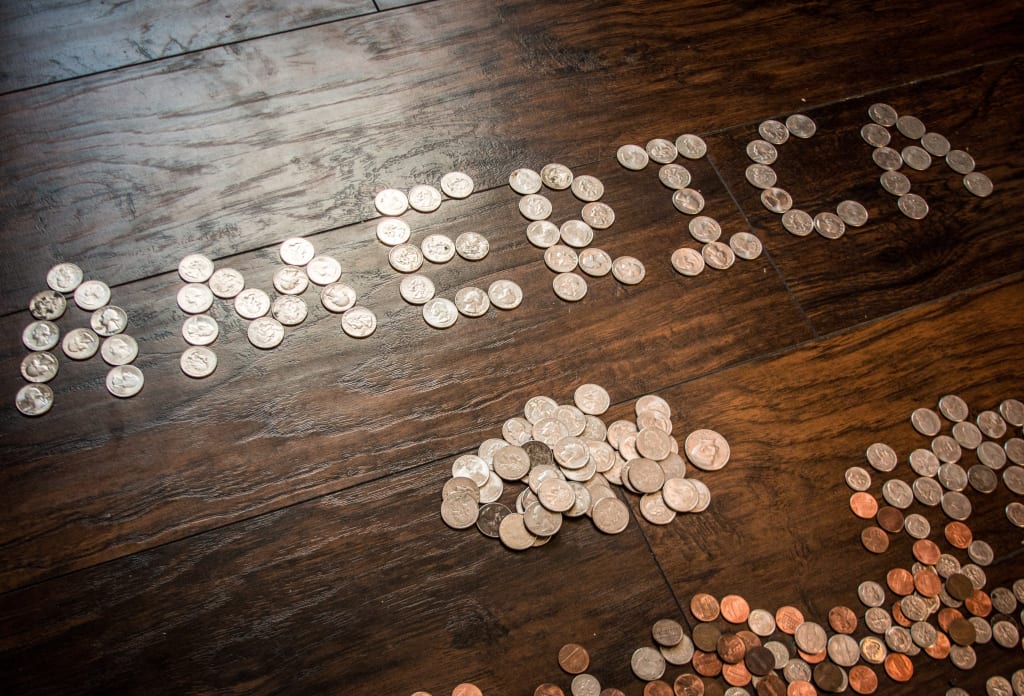The Virtue in Misfortune
No one ever said misfortune favored the righteous.

This is more money than I’ve ever had in a bank account and not even half of what I’ve borrowed in the past five years.
I didn’t notice the wire transfer into my account for six days since I only check my bank account on paydays. This is a form of self-soothing, a learned behavior from my days of fad dieting, when I’d only weigh myself first thing in the morning, completely naked, before taking in even a sip of water. Back in those days, my weight ruled my life, controlled where I would go and who I would see (or rather, who I would allow to see me) for the day. As time went by, I convinced myself that I had overcome my body insecurity, although really I had just replaced the number on my scale with the number in my bank account as the primary metric of my self-worth.
The wire must be some sort of financial scam. Twenty thousand unexpected dollars identifying themselves only by a long string of numbers. I don’t really know how financial crimes work—that’s rich-people stuff—but this amount of money, in my account? I know better than to trust it. I can’t quite figure out the details but this money must have come from some elaborate grifter who understands the bowels of the financial system better than I do and would soon syphon out the entirety of my savings.
I’ve been on hold with the bank for nine minutes, plus the two minutes it took me to work my way through the phone tree. Once I’m paired up with a customer service associate, a distant-sounding woman speaking in an obviously scripted and sight-read monotone, she asks me which charge I suspect is fraudulent. It’s not a suspicion, I’m thinking. This is definitely fraud.
She taps at a keyboard and clicks her mouse for a few moments, audibly exhaling impatiently, then asks if I will hold for a moment and then puts me on hold before I have a chance to answer. Right as the hold music transitions into an internal advertisement for a new low-rate mortgage, she interrupts without pause: ThankyouforholdingwefindnoevidenceoffraudulentbehaviorwiththistransactionisthereanythingelseIcandoforyouatthistime?
Flustered and disoriented, I’m eventually able to stumble over financial terms well enough to indicate that I have no idea where this deposit came from, who sent it, or why, but that it can’t be right. Ma’am, are you asking me why you have more money in your account than you expect? I can tell by the tone in her voice that what she’s really saying is, Don’t waste another second of my time. I know I must have said something stupid, but I don’t know which part was stupid or why. I ask if she can verify who the owner of the transferring account was, forcing a light laugh through my stuttered babbling, trying to convey acknowledgement and apology for my stupidity. Without notice I’m on hold again, this time for just a single stanza of the elevator music before she’s back with the name of the account holder.
The $20,000 is mine, and it came from my mom and dad’s joint savings account.
____________________________________________________
I’ve never known what it’s like to have money.
We were never hungry, never had to ration food or deny ourselves second helpings, but we always knew how close we were to being hungry. Most meals came from cans, dressed up with ketchup and hot sauce for flavor, and the only cheese I ever knew was either powdered or packaged in single-serve plastic sleeves. Three times a year, after my physical exam and my bi-annual dentist appointments, my mom would take me through the McDonald’s drive-through before dropping me off at school. The concept of money was never far from anyone’s mind. My dad had a little black “budget” notebook that he replaced once a year. When I was little I thought that this was where money came from, that somehow my dad checking receipts and scribbling numbers into the notebook was how cash landed in my parents’ wallets, as if balancing the budget were a paying job. As I grew older and began to understand the concept of money as a number that determines who you can be in the world, I began to understand that the more meticulous my father’s scrutiny of the budget book became, the closer my family came to being Nobody.
College was never a discussion; a bachelor’s degree was a pipedream. A nursing license was also beyond reach, but by just a small enough margin that I could convince myself that with a couple of years replacing school time with work hours, applying to any scholarship or grant that I could find, and maybe supplementing my savings with a student loan, I could just barely put myself through nursing school and come out the other end with a real salary, with healthcare and benefits and maybe a level of debt that I could pay off in less than a decade. So I spent the last of my teenage years racking up hours at the nearby country club bussing tables, expediting kitchen orders, unloading supply shipments, anything that could be done in the back of the house or behind the scenes. I could have worked fewer hours and made more money waitressing, and I knew this, but having seen the price of an annual membership, the lunch bills that doubled what I took home in a week, and the flippancy with which members tossed their cards at the bill, I couldn’t bear to serve these people directly, to paste an unassuming smile on my face while listing off the entree specials that cost more than what it took to feed my entire family. Instead I took on the less glamorous, more thankless roles alongside the Mexicans and parolees, and this became my identity. My indignation of being overworked and undercompensated became a cross I bore silently but proudly next to the trust-funded housewives who spent their days sipping chardonnay and ogling at their fit but still working-class (and therefore beneath them) tennis instructors.
I tried to cut down on food spending by perusing dating apps and getting guys to take me out for meals. I’d eat half my meal and get the rest boxed up to go, which served the dual purpose of ensuring both that I had lunch the next day and that the guy wouldn’t contact me again. None of them ever said anything but I always knew they found it uncouth to take home leftovers from a meal I didn’t pay for. I toyed with the idea of a sugar daddy and knew the option was there, and in fact I had a handful of friends who had successfully worked wealthy older men, but as with serving the rich housewives at the country club, I couldn’t bring myself to do it. Not that I consider myself above it. Selling your body is hardly a despicable act when companies out in the world are selling off the future of our planet (which is now called a “natural resource”) or our “personal data” (which used to be called “none of your business”), but if I couldn’t even manage a smile while taking a hedge fund analyst’s brunch order, there was no way I’d be able to play the part of the always-gracious pretty young sugar baby. Instead I kept my hands calloused and my pockets deep until I could ship myself off to school to learn a noble and well-paying trade.
After nursing school I knew I wasn’t going to work in some cushy clinic or pretentious private practice or even a well-funded hospital that occasionally offered drippings to the poor in the form of pro-bono work. That’s how I landed at St. Mary’s Healthcare for the Homeless. “Homeless” is actually a term from a bygone era. We call them “housing-insecure” now. It helps us feel less guilty about it.
I love my patients. I see their struggle, the way they fall from poverty into drugs and end up in jail, the way they’re released on parole and forced to take a minimum wage job that doesn’t cover the cost of survival, forcing them back into drugs until they’re inevitably arrested once again, and around and around they go. It’s not their fault. It’s a merry-go-round that never slows down enough to let anyone off. I feel for them. I see them. I feel like I am one of them. Even with my RN badge and my stethoscope, I too am stuck on a merry-go-round: I work, pay my rent, pay my student loan, watch my rent increase and my loan accumulate interest, watch the cost of living climb, and all the while my salary stays the same. With some creativity I’m able to make my budget work this year, but next year I’ll need to make some “lifestyle adjustments.” This will mean reducing the leisure section of my budget, reducing my spending at restaurants, on clothes, on any activity that brings me joy but neither income nor the promise of future income. Gifts for my nieces will also have to be slashed. As will charitable donations.
A somber awareness shudders through me as I realize that alongside the bare-minimum budget my dad calculated in his notebook, he must have also been calculating exactly how much money he and my mom could stash away to give to me as an adult, to be able to provide for me and protect me even after I had left their home. I thought of all the small luxuries they must have deprived themselves of to one day be able to silently hand off a life-changing amount of money to me, and I realize in that moment that their true sacrifice was in depriving me of those same small luxuries.
With the $20,000 I didn’t earn, I could pay off the remainder of my loans and have enough left over for a down payment on a house. Relief would be a normal emotion to feel right now. Even guilt would be an understandable response. I didn’t earn this money, didn’t do anything to deserve it. This is just a smaller-scale version of the trust fund population at the country club whose parents paid for their education, whose lineage landed them their first job, and whose capital gains covered the down payment on their homes. The way I viewed those country club members--privileged, secure, exempt from the discomfiture of so-called lifestyle creep--that will be how my “housing-insecure” patients will now view me. And they’ll be justified. Though I can rationalize feelings of both gratitude and guilt, neither are my reality. What I’m really thinking as I reckon with my new place in the social hierarchy is that I’ll never be able to tell anyone about this. Everyone around me is a modern proletariat indignant about their place in the world, conflating misfortune and virtue, models of rectitude because they are the have-nots. That’s the role I’ve played my whole life. I’ve criticized the richest of CEOs for donating a mere fraction of a percentage of their total wealth, amounting to millions of dollars, for not giving more, yet without allowing myself to verbalize the thought even in my head I know that now that my net worth has more than doubled, I won’t adjust my annual donations. This inconsistency would rot the core of who I am, reducing my once-compassionate character to sanctimony, so I suppress this realization as both my conscious and subconscious minds come to a gentleman’s agreement that I earned this money. I worked for it. I deserve it.
About the Creator
Keely O'Keefe
Business school drop out.






Comments
There are no comments for this story
Be the first to respond and start the conversation.